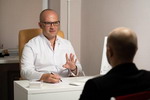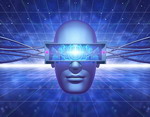 One of my patients, Debbie, asked if I would do a newsletter on how to fight aging. Her thought was 10 Tips for Fighting Aging. That sounded like a great idea, so I started tackling the subject. I quickly noticed, as I started writing down ideas, that this is actually a very complex subject. There are tens of thousands of research papers on this subject and about as many opinions as there are papers. So, my challenge is to simplify this subject down to actionable steps without a whole lot of explanation.
One of my patients, Debbie, asked if I would do a newsletter on how to fight aging. Her thought was 10 Tips for Fighting Aging. That sounded like a great idea, so I started tackling the subject. I quickly noticed, as I started writing down ideas, that this is actually a very complex subject. There are tens of thousands of research papers on this subject and about as many opinions as there are papers. So, my challenge is to simplify this subject down to actionable steps without a whole lot of explanation.
 The first question I have to ask myself is what do real people mean when they say they have aging symptoms they want to fight? The biggest complaint, by far, doctors hear about is fatigue, and a lack of energy to do the things you want to do. The next most common is a pain for no good reason. The third might be a lack of strength, stamina, balance, and coordination. We must not forget number four, the loss of skin tone making us look old and saggy. Number five usually has to do with bowel/urinary complaints – too much or not enough or both. Way down at number six is complaining about some chronic disease of one sort or another. Does this list sound like the symptoms your doctor likes to chalk up to “Oh well, you are just getting older”? We don’t want to hear this. We don’t want to get older.
The first question I have to ask myself is what do real people mean when they say they have aging symptoms they want to fight? The biggest complaint, by far, doctors hear about is fatigue, and a lack of energy to do the things you want to do. The next most common is a pain for no good reason. The third might be a lack of strength, stamina, balance, and coordination. We must not forget number four, the loss of skin tone making us look old and saggy. Number five usually has to do with bowel/urinary complaints – too much or not enough or both. Way down at number six is complaining about some chronic disease of one sort or another. Does this list sound like the symptoms your doctor likes to chalk up to “Oh well, you are just getting older”? We don’t want to hear this. We don’t want to get older.
 So, what are the basic life processes we can engage to avert or change these aging outcomes? A very easy way to understand aging or any pathology in the body is to break it down to an excess, deficiency, or confusion in the body. If something is not working right, it is because there is either too much of something, not enough of something, or the control circuits are scrambled. I believe that if we keep things simplified to this level, we can make a complex subject easy to understand.
So, what are the basic life processes we can engage to avert or change these aging outcomes? A very easy way to understand aging or any pathology in the body is to break it down to an excess, deficiency, or confusion in the body. If something is not working right, it is because there is either too much of something, not enough of something, or the control circuits are scrambled. I believe that if we keep things simplified to this level, we can make a complex subject easy to understand.
 Excess. What do we mean by excess? The easiest arena to see excess in is exposure to poisons. Any at all is an excess for our body, so clearly, we want to avoid as much exposure to poisons as possible. Some exposure is going to happen no matter what. Obviously, don’t smoke. The air we breathe is full of toxic chemicals, so unless you know a way to get by without breathing, you will be exposed to these poisons. You diminish this by using good air filters at home and at work. The same is true with water. City water has poisons in it, so filter it. Bottled water these days comes in plastic, which gets into the water – more poison. Filtering your air and water is an actionable step to staying healthier. Food is probably the biggest source of poisons. Pesticides and herbicides on vegetables and fruits must be avoided, so buy organic. Packaged foods are full of chemicals that are not good for the body. Avoid any food where you do not recognize the ingredients as healthy. Sorry, natural flavors are not safe. Even the boxes themselves are treated with poisonous chemicals that can leach into the foods.
Excess. What do we mean by excess? The easiest arena to see excess in is exposure to poisons. Any at all is an excess for our body, so clearly, we want to avoid as much exposure to poisons as possible. Some exposure is going to happen no matter what. Obviously, don’t smoke. The air we breathe is full of toxic chemicals, so unless you know a way to get by without breathing, you will be exposed to these poisons. You diminish this by using good air filters at home and at work. The same is true with water. City water has poisons in it, so filter it. Bottled water these days comes in plastic, which gets into the water – more poison. Filtering your air and water is an actionable step to staying healthier. Food is probably the biggest source of poisons. Pesticides and herbicides on vegetables and fruits must be avoided, so buy organic. Packaged foods are full of chemicals that are not good for the body. Avoid any food where you do not recognize the ingredients as healthy. Sorry, natural flavors are not safe. Even the boxes themselves are treated with poisonous chemicals that can leach into the foods.
 What about the foods themselves? Are they safe to begin with? Any food in excess is dangerous. Moderation in all things is a key to aging well. Alcohol is a perfect example. One unit of alcohol actually lowers your chance of dying early, but more than one unit works against you very quickly. Most vegetable oils are poisonous due to high amounts of linoleic acid. Don’t eat them. These same toxins are in peanut butter, most nuts, mayo, margarine, chips, bakery goods, commercial cookies, fried foods, and thousands more. If the nutrition label lists polyunsaturated fats, it is usually listing poisons. These particular poisons shut down your energy-producing mechanisms. Olive, avocado, and other high oleic oils are safer. On the other hand, the most common saturated fat, palmitic acid, is also inflammatory when taken in excessive amounts. Sugar is a toxic insult to the body. Don’t be fooled by the 30 different names they use for sugar to hide how much sugar is actually in foods. Be aware that simple carbohydrate foods, like grains or tubers, turn into sugar within minutes in the gut. Sugar is one of the “foods” that directly create much of what we call aging by attaching to our proteins and making them not work right. On nerves, this creates peripheral neuropathy; in the skin, it creates a loss of elasticity and sagging; in arteries, it creates the hardening of the arteries; in the liver, it creates fatty liver; and the list goes on and on. Sugar and oils make you old, so don’t eat them. The key is to eat a highly varied diet in order to avoid an excess of any one thing. The body likes variety.
What about the foods themselves? Are they safe to begin with? Any food in excess is dangerous. Moderation in all things is a key to aging well. Alcohol is a perfect example. One unit of alcohol actually lowers your chance of dying early, but more than one unit works against you very quickly. Most vegetable oils are poisonous due to high amounts of linoleic acid. Don’t eat them. These same toxins are in peanut butter, most nuts, mayo, margarine, chips, bakery goods, commercial cookies, fried foods, and thousands more. If the nutrition label lists polyunsaturated fats, it is usually listing poisons. These particular poisons shut down your energy-producing mechanisms. Olive, avocado, and other high oleic oils are safer. On the other hand, the most common saturated fat, palmitic acid, is also inflammatory when taken in excessive amounts. Sugar is a toxic insult to the body. Don’t be fooled by the 30 different names they use for sugar to hide how much sugar is actually in foods. Be aware that simple carbohydrate foods, like grains or tubers, turn into sugar within minutes in the gut. Sugar is one of the “foods” that directly create much of what we call aging by attaching to our proteins and making them not work right. On nerves, this creates peripheral neuropathy; in the skin, it creates a loss of elasticity and sagging; in arteries, it creates the hardening of the arteries; in the liver, it creates fatty liver; and the list goes on and on. Sugar and oils make you old, so don’t eat them. The key is to eat a highly varied diet in order to avoid an excess of any one thing. The body likes variety.
 Another category of excesses is hormone disruptors: chemicals that mess up your hormones. The most common of these are ones that pretend to be estrogen: the female hormone. These are present in plastic water bottles, cosmetics, fire retardants in furniture, fragrances, household cleaners, and most things made with plastic. Action – store foods and drinks in glass containers; clean with vinegar and baking soda; buy unscented products, and use simple non-chemical cosmetics.
Another category of excesses is hormone disruptors: chemicals that mess up your hormones. The most common of these are ones that pretend to be estrogen: the female hormone. These are present in plastic water bottles, cosmetics, fire retardants in furniture, fragrances, household cleaners, and most things made with plastic. Action – store foods and drinks in glass containers; clean with vinegar and baking soda; buy unscented products, and use simple non-chemical cosmetics.
 Okay, let’s switch to deficiency concerns. What are you not getting enough of to stay sufficiently healthy to fight the onslaught of aging? The most obvious is exercise. Occasionally I see folks that have sustained an injury by doing too much, but far and away the most common problem is not enough exercise. No amount of a good diet will compensate for a lack of exercise, just like no amount of exercise will compensate for a bad diet. Exercise means more than just going to a gym to avoid common issues associated with aging. You need a certain amount of lifting heavy things to combat osteoporosis. Sorry, the advice that walking around the block will fight weak bones is a lie. You must stress the bones with enough force to cause them to flex. This is what stimulates bone strength. Likewise, muscle strength requires you to stress the muscle past its current limits if you want to stay strong. Muscle weakness is one of the chief signs of aging from a medical perspective.
Okay, let’s switch to deficiency concerns. What are you not getting enough of to stay sufficiently healthy to fight the onslaught of aging? The most obvious is exercise. Occasionally I see folks that have sustained an injury by doing too much, but far and away the most common problem is not enough exercise. No amount of a good diet will compensate for a lack of exercise, just like no amount of exercise will compensate for a bad diet. Exercise means more than just going to a gym to avoid common issues associated with aging. You need a certain amount of lifting heavy things to combat osteoporosis. Sorry, the advice that walking around the block will fight weak bones is a lie. You must stress the bones with enough force to cause them to flex. This is what stimulates bone strength. Likewise, muscle strength requires you to stress the muscle past its current limits if you want to stay strong. Muscle weakness is one of the chief signs of aging from a medical perspective.
 Exercise is a lot more than getting strong. You also need balance, aerobic capacity, and stability. Each of these requires different training techniques several times a week. Balance exercises make use of soft or wobbly surfaces to train your balance reflexes. Aerobic capacity means pushing yourself in an exercise to a point that it is too hard to talk because you are breathing so hard. A simple protocol is interval training in which you do something aerobic as fast as you can for 30 seconds and do this at least 5 times in one day, twice a week. Most people wait 2 to 5 minutes between a fast exercise, like running or cycling, by going at a leisurely pace, then doing another 30-second set. Repeat this 5 times. Stability exercise trains your back muscles by holding still in stressed positions for 8 seconds. These back muscles are the ones that protect you from a back injury. Foundation exercises are my favorite for this purpose. Link.
Exercise is a lot more than getting strong. You also need balance, aerobic capacity, and stability. Each of these requires different training techniques several times a week. Balance exercises make use of soft or wobbly surfaces to train your balance reflexes. Aerobic capacity means pushing yourself in an exercise to a point that it is too hard to talk because you are breathing so hard. A simple protocol is interval training in which you do something aerobic as fast as you can for 30 seconds and do this at least 5 times in one day, twice a week. Most people wait 2 to 5 minutes between a fast exercise, like running or cycling, by going at a leisurely pace, then doing another 30-second set. Repeat this 5 times. Stability exercise trains your back muscles by holding still in stressed positions for 8 seconds. These back muscles are the ones that protect you from a back injury. Foundation exercises are my favorite for this purpose. Link.
 Other deficiencies would include getting the right nutrients in the right amounts. As we get older, our digestion gets weaker, so we need much more protein to meet our needs. Various diet styles have issues with certain nutrient deficiencies that must be addressed. We have essential needs for protein, fats, fibers, vitamins, and minerals, but there is no essential carbohydrate for humans. Another essential nutrient is light at various frequencies. We tend to be deficient in both the infrared and the ultraviolet wavelengths. We need nature and human contact/participation. We need brain stimulation. The brain literally shrinks if we do not challenge it regularly with deep thinking and/or problem-solving tasks. Good quality sleep is a really big need that most people do not get enough of. Sleep is when we consolidate our memories from the day into long-term memory as well as when we do most of our complex creative problem-solving. Get 8 hours of good sleep every night.
Other deficiencies would include getting the right nutrients in the right amounts. As we get older, our digestion gets weaker, so we need much more protein to meet our needs. Various diet styles have issues with certain nutrient deficiencies that must be addressed. We have essential needs for protein, fats, fibers, vitamins, and minerals, but there is no essential carbohydrate for humans. Another essential nutrient is light at various frequencies. We tend to be deficient in both the infrared and the ultraviolet wavelengths. We need nature and human contact/participation. We need brain stimulation. The brain literally shrinks if we do not challenge it regularly with deep thinking and/or problem-solving tasks. Good quality sleep is a really big need that most people do not get enough of. Sleep is when we consolidate our memories from the day into long-term memory as well as when we do most of our complex creative problem-solving. Get 8 hours of good sleep every night.
 Let’s take a look at how confusion in our biology takes place. We are rhythmic creatures. We must respect our rhythms, such as our daily circadian rhythm for when to sleep and when to wake up. When we don’t, all sorts of biology starts going wrong inside us. We have rhythms about when to eat and when to digest and rest. The body needs a minimum of 12 consecutive hours without food each day. Foods naturally have certain balances of nutrients. When we process foods, we disrupt these balances and this confuses our bodies. A simple example is a sugar. Sugar is found in cane, beet, and fruits. But in nature, it is in small quantities and complexed with a ton of fiber and phytonutrients. It is when we extract out just one component, the sugar, and consume that by itself that we end up with confused signaling in the body leading to diabetes and other diseases.
Let’s take a look at how confusion in our biology takes place. We are rhythmic creatures. We must respect our rhythms, such as our daily circadian rhythm for when to sleep and when to wake up. When we don’t, all sorts of biology starts going wrong inside us. We have rhythms about when to eat and when to digest and rest. The body needs a minimum of 12 consecutive hours without food each day. Foods naturally have certain balances of nutrients. When we process foods, we disrupt these balances and this confuses our bodies. A simple example is a sugar. Sugar is found in cane, beet, and fruits. But in nature, it is in small quantities and complexed with a ton of fiber and phytonutrients. It is when we extract out just one component, the sugar, and consume that by itself that we end up with confused signaling in the body leading to diabetes and other diseases.
 Our brain is massively complex. The more complex a system is the easier it is to unbalance it. This gets amplified when you understand that the emotion centers of our brain are functionally the same thing as our immune system. Consequently, having a good relationship with the realities of life is essential to having a properly functioning immune system. When this gets spun sideways with false beliefs, entitlements, and illusions of importance, then we blow out our immune system and set ourselves up for every disease imaginable. Cancer is a classic consequence of confusion in the immune system.
Our brain is massively complex. The more complex a system is the easier it is to unbalance it. This gets amplified when you understand that the emotion centers of our brain are functionally the same thing as our immune system. Consequently, having a good relationship with the realities of life is essential to having a properly functioning immune system. When this gets spun sideways with false beliefs, entitlements, and illusions of importance, then we blow out our immune system and set ourselves up for every disease imaginable. Cancer is a classic consequence of confusion in the immune system.
 So what tips have we covered?
So what tips have we covered?
Avoid poisons – get smart and learn about what is poisonous
Avoid excess anything – especially food and alcohol
Move it – exercise for strength, balance, endurance, and stability
Get your nutrients – food, light, friendship, nature, stimulation, sleep
Stay in rhythm – food, sleep, activity
Seek harmony with life
 There we have it, six basic tips for staying young. Yes, there is lots of research trying to find that magic elixir that will keep us young, and little bits and pieces to that puzzle are being figured out. But nothing really big exists yet that will beat out the basics. The biggest tip to staying young is to stay healthy and active.
There we have it, six basic tips for staying young. Yes, there is lots of research trying to find that magic elixir that will keep us young, and little bits and pieces to that puzzle are being figured out. But nothing really big exists yet that will beat out the basics. The biggest tip to staying young is to stay healthy and active.
Take care,
David
